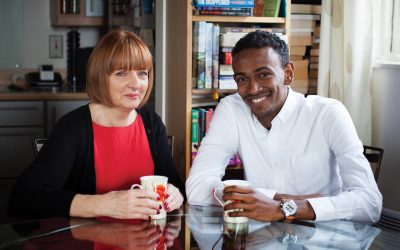South Sudan, Yemen, north-east Nigeria and Somalia – countries in turmoil, weighed down by conflict, famine and poverty.
According to Priti Patel, the world is currently facing a series of humanitarian crises which, when taken together, are on a scale never witnessed before.
And that’s why, according to the former Secretary of State for International Development, the United Kingdom needs to be taking a lead.
“There are no words which can describe the horrors we are witnessing in terms of famine and drought, but also persecution,” she explained while in post.
“Of course, many of those problems are man-made. I have been to South Sudan where I have seen people persecuted, people who have been left destitute. We don’t turn our backs on those countries and those individuals who need a voice.”
It’s why, when pushed on the controversial 2015 decision for the UK to commit 0.7% of its Gross Domestic Product on foreign aid at a time of austerity when other Whitehall departments were having their budgets slashed, Priti Patel doesn’t bat an eyelid.
By putting in the money now, by working collectively with Rotary, Bill Gates, with the big partners who have come together to end polio now, we can say to other countries and governments to step up now”
Opponents argue how can the UK justify such a commitment when that cash could be spent on key areas at home such as health and education?
However, Priti Patel points out that because of this commitment, other countries have now stepped up to the plate.
“Instead of being vilified, it is a Conservative government which deserves credit for this,” she insisted.
“The point about 0.7% is how you spend it and how you leverage it in terms of your own domestic security, along with domestic and international interests.
“Health is a very good example where we are spending money to not only save lives but change lives, and achieving that domestically. Diseases know no boundaries or borders, whether it is polio, Ebola or the Zika virus.
“We have been at the forefront of tackling those diseases, as well as looking at the remedies. Look at money we have spent on innovation and research in British universities which, by the way, has created jobs in the UK.
“When it comes to our aid spending, no-one can accuse this Government of just spending money. I have been mindful of stamping out the inefficiencies of spending. It is taxpayers’ money. And you will not find a stronger advocate and champion of the UK taxpayer than me.”
Priti Patel revealed she was delighted the government committed £100 million of her budget this summer in the fight against polio. Rotary’s campaigning heavily influenced her thinking towards making the financial commitment.
There are no words which can describe the horrors we are witnessing in terms of famine and drought, but also persecution.”
“Rotary played a big part in the decision to give that money,” she explained.
“Rotary has a great footprint, not just locally, but internationally for all the good work it is doing. Through that awareness-raising, it has made a very big difference. But for the election, we would have made this announcement much earlier.”
Polio, she said, is just one of many of the ‘medieval’ diseases which need to be tackled and eradicated in the 21st century. “We need to go on that extra mile of the journey towards polio eradication,” added Priti Patel.
“People’s life chances, their life expectancy to get themselves out of poverty are hindered by these diseases.”
“So I think we should stand tall, not just for the commitment that we have made of £100 million to eradicate polio, but actually it is the UK, thanks to the generosity of British taxpayers, which has enabled this.”
“By putting in the money now, by working collectively with Rotary, Bill Gates, with the big partners who have come together to end polio now, we can say to other countries and governments to step up now.”
“We should be very mindful of the countries we are working in: Nigeria; Afghanistan; and Pakistan where there have been very significant cultural barriers to immunisation. This is something we all have to collectively tackle and be responsible for.”
“And when there have been attacks on polio workers, we need to call out this type of behaviour which needs to change to ensure immunisation can take place so polio workers can continue saving lives and make a big difference.”
As for the future, Priti Patel says she wants the Government to work closely with Rotary in areas such as poverty alleviation, slavery, trafficking, as well as women and economic empowerment.
“Together, we need to end some of the appalling things, which quite frankly, are taking place in the 21st century and which should have been dealt with a long time ago.”
“I think working with Rotary to show the UK is leading the world in these areas, that we can be a force for good and strong leaders in all of these areas, is exactly where we should be coming together.”


























































